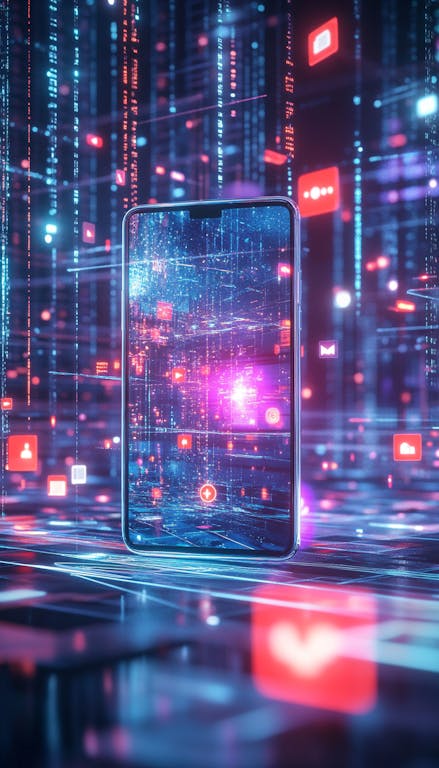An alternative angle to take on this is to look at Apple’s iMessage service and what it is. iMessage is a closed, proprietary service that does not work unless every user has an iPhone or an iPad. RCS is rather different from that. It works pretty much anywhere with pretty much any phone number, just like SMS. If I were to send an RCS message to someone who doesn’t have RCS, it would still get to them because the system would just revert to using SMS.
What is RCS?
People often hail Rich Communication Services, or “RCS,” as the “future of texting” on their phones. This service—whose name implies added richness—bestows a text and multimedia messaging experience on phones that is decidedly more pleasant and engaging. Phoning it in “Hello!” can offer nothing compared to the face one gets when tapping “Hey!”Despite my disdain for traditional texting with a phone number, I miss the simpler times when instant messaging was just that. At least with basic texting, there was no such thing as false urgency. RCS, though a step up from plain ol’ SMS, doesn’t really add a whole lot to my life.
Alternatively, you can think of RCS as Apple’s iMessage service. However, unlike iMessage—which requires people to have an iPhone or iPad—RCS essentially works with any phone number, just like SMS. And if either party doesn’t have RCS yet, it simply defaults back to SMS, so no messages are lost.
RCS Compatibility: The Carrier and Apple Factor
To start, RCS is not merely an upgrade your phone can receive, like an all-new iteration of Android or another app update. Your mobile operator plays a huge part in whether RCS will actually work for you. The positive news is that your carrier might already support RCS—many have for years—and could let you use it whether or not your WiFi-connected device does.
To remedy the situation, the Universal Profile emerged. This established a broadly defined, general set of features and functionality that all carriers, manufacturers, and OS providers who have signed on to the Universal Profile promise to support. And the companies that support the Universal Profile include a formidable number of carriers, manufacturers, and OS providers. So the short answer to the question of whether you’ll get the same RCS features as someone else is yes.
Apple’s RCS Adoption
As RCS spreads to more and more people, Apple seems to have ignored its development altogether. iPhones have two methods for text messaging: iMessage and SMS. iMessage chats are in blue, while everything else is green. Up until 2024, those green messages could only be SMS. This fact has particularly irritated Android users. Since the iPhone only supported SMS, any text message from a non-iPhone to an iPhone was forced to use the older, outdated standard. By the way, this resulted in low-quality photos and videos, which iPhone users then blamed on the sender.
In late 2023, Apple revealed its plans to support the Rich Communication Services (RCS) protocol on iPhones starting in 2024. Apple publicized this in response to Google’s prodding, but the recent regulatory chill over big tech may have had a more significant influence on the decision. RCS is already widely available and in use on most Android phones. Neither company has spent much time talking up the direct benefits to users that adopting RCS will confer. From a user-facing point of view, being able to send and receive photographs and videos without the visible degradation in quality that’s currently allowed by the federal government will be a nice benefit, even if iPhones still use the iMessage platform for sending and receiving “blue bubble” chats.
Google’s Push for RCS
Getting all the carriers and manufacturers to support a new standard takes a lot of work. So, to kick things off, Google went ahead and built the new standard. It is called “Jibe.” The basis of Jibe is RCS with Universal Profile. The Jibe standard is the future of RCS and, therefore, text messaging.
You might be asking yourself why Google cares so much about getting RCS out to the masses. The answer is pretty straightforward: Google needs a unified chat experience. For years, the company has thrown a bunch of different chat apps at us with very little success. The company now hopes that RCS can integrate all these chat apps into a unified chat experience.
You do not need several different messaging apps for diverse reasons: Most Android devices already come pre-installed with the Google Messages app. Given that most carriers support RCS, Google Messages serves as an excellent messaging app for most users, requiring minimal setup effort. In simpler terms, Google Messages essentially serves as iMessage for the Android user base.
Is RCS already on your Android device?
RCS is probably on your Android phone, whether you know it or not. Several of the biggest names in the mobile carrier business, including AT&T, T-Mobile, and Verizon in the U.S., support the basic premise of RCS.
The kind of phone you have also plays a part in whether you have RCS, since support is patchy across Android devices. Samsung Galaxy and Google Pixel phones, however, come with the Google Messages app that has RCS baked into it. RCS continues to expand; Google has implemented carrier enabling and device enabling measures to elevate RCS to a fundamental level on numerous Android phones.

